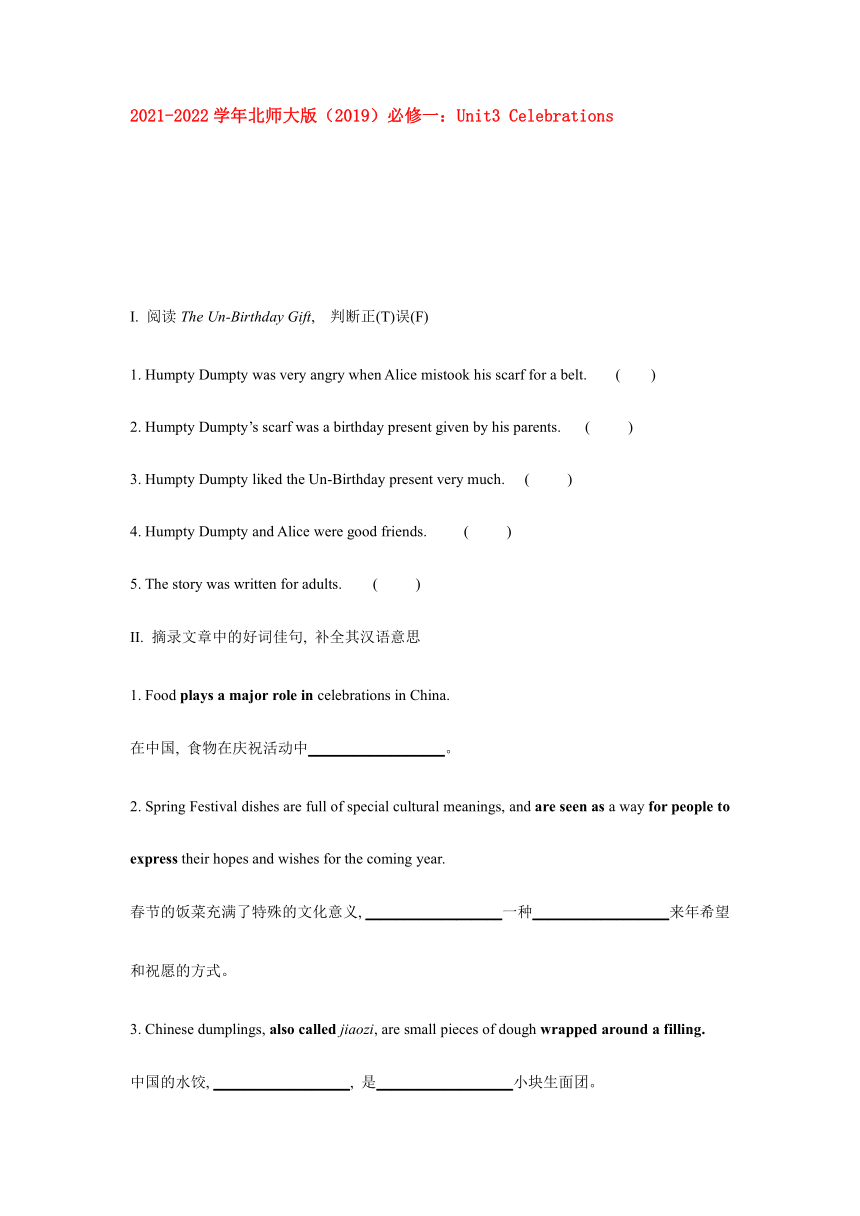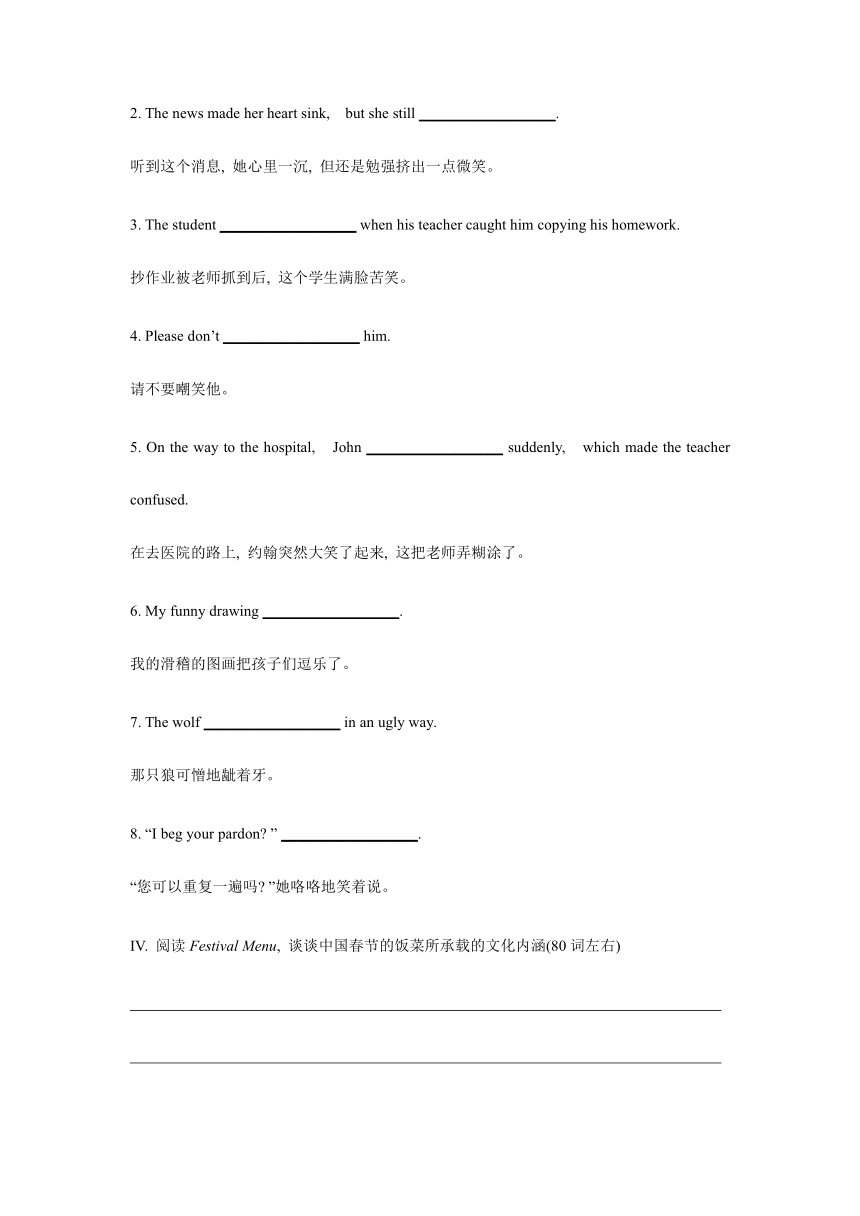北师大版(2019)必修一:Unit3 Celebrations Writing Workshop & Reading Club同步练习(含答案)
文档属性
| 名称 | 北师大版(2019)必修一:Unit3 Celebrations Writing Workshop & Reading Club同步练习(含答案) |  | |
| 格式 | doc | ||
| 文件大小 | 43.5KB | ||
| 资源类型 | 教案 | ||
| 版本资源 | 北师大版(2019) | ||
| 科目 | 英语 | ||
| 更新时间 | 2021-09-08 12:13:50 | ||
图片预览



文档简介
2021-2022学年北师大版(2019)必修一:Unit3
Celebrations
I.
阅读The
Un-Birthday
Gift,
判断正(T)误(F)
1.
Humpty
Dumpty
was
very
angry
when
Alice
mistook
his
scarf
for
a
belt.
( )
2.
Humpty
Dumpty’s
scarf
was
a
birthday
present
given
by
his
parents.
(
)
3.
Humpty
Dumpty
liked
the
Un-Birthday
present
very
much.
(
)
4.
Humpty
Dumpty
and
Alice
were
good
friends.
(
)
5.
The
story
was
written
for
adults.
(
)
II.
摘录文章中的好词佳句,
补全其汉语意思
1.
Food
plays
a
major
role
in
celebrations
in
China.
在中国,
食物在庆祝活动中__________________。
2.
Spring
Festival
dishes
are
full
of
special
cultural
meanings,
and
are
seen
as
a
way
for
people
to
express
their
hopes
and
wishes
for
the
coming
year.
春节的饭菜充满了特殊的文化意义,
__________________一种__________________来年希望和祝愿的方式。
3.
Chinese
dumplings,
also
called
jiaozi,
are
small
pieces
of
dough
wrapped
around
a
filling.
中国的水饺,
__________________,
是__________________小块生面团。
4.
So
it
is
believed
that
they
will
bring
wealth
and
prosperity.
因此__________________,
他们能带来财富和繁荣。
5.
The
round
shape
is
also
a
symbol
of
gathering
together,
standing
for
happiness
in
the
new
year.
圆形也是团聚的__________________,
__________________新年的幸福。
6.
“If
only
I
knew,
”
she
thought
to
herself,
“which
was
neck
and
which
was
waist.
”
她__________________:
“__________________我知道哪是脖子哪是腰就好了。”
7.
“I
know
it’s
very
ignorant
of
me,
”
Alice
said,
so
humbly
that
Humpty
Dumpty
relented.
“我知道__________________,
”爱丽丝说,
__________________矮胖子变温和了。
8.
“I’d
rather
see
that
done
on
paper,
”
he
said.
“__________________,
”他说。
9.
Alice
couldn’t
help
smiling
as
she
took
out
her
notebook.
爱丽丝拿出笔记本,
__________________。
10.
As
I
was
saying,
that
seems
to
be
done
right—though
I
haven’t
time
to
look
it
over
thoroughly
right
now.
__________________,
好像做对了——虽然我没时间立即全面__________________。
III.情境应用
1.
I
saw
the
joy
__________________.
?
从她的笑脸上我看到了喜悦。
2.
The
news
made
her
heart
sink,
but
she
still
__________________.
?
听到这个消息,
她心里一沉,
但还是勉强挤出一点微笑。
3.
The
student
__________________
when
his
teacher
caught
him
copying
his
homework.
?
抄作业被老师抓到后,
这个学生满脸苦笑。
4.
Please
don’t
__________________
him.
?
请不要嘲笑他。
5.
On
the
way
to
the
hospital,
John
__________________
suddenly,
which
made
the
teacher
confused.
?
在去医院的路上,
约翰突然大笑了起来,
这把老师弄糊涂了。
6.
My
funny
drawing
__________________.
?
我的滑稽的图画把孩子们逗乐了。
7.
The
wolf
__________________
in
an
ugly
way.
那只狼可憎地龇着牙。
8.
“I
beg
your
pardon?
”
__________________.
?
“您可以重复一遍吗?
”她咯咯地笑着说。
IV.
阅读Festival
Menu,
谈谈中国春节的饭菜所承载的文化内涵(80词左右)
参考答案
I.
1.
Humpty
Dumpty
was
very
angry
when
Alice
mistook
his
scarf
for
a
belt.
( T )
2.
Humpty
Dumpty’s
scarf
was
a
birthday
present
given
by
his
parents.
( F )
3.
Humpty
Dumpty
liked
the
Un-Birthday
present
very
much.
( T )
4.
Humpty
Dumpty
and
Alice
were
good
friends.
( T )
5.
The
story
was
written
for
adults.
( F )
II.
1.
Food
plays
a
major
role
in
celebrations
in
China.
在中国,
食物在庆祝活动中起主要作用。
2.
Spring
Festival
dishes
are
full
of
special
cultural
meanings,
and
are
seen
as
a
way
for
people
to
express
their
hopes
and
wishes
for
the
coming
year.
春节的饭菜充满了特殊的文化意义,
被看作是一种人们表达来年希望和祝愿的方式。
3.
Chinese
dumplings,
also
called
jiaozi,
are
small
pieces
of
dough
wrapped
around
a
filling.
中国的水饺,
也叫饺子,
是里面包着馅的小块生面团。
4.
So
it
is
believed
that
they
will
bring
wealth
and
prosperity.
因此人们相信,
他们能带来财富和繁荣。
5.
The
round
shape
is
also
a
symbol
of
gathering
together,
standing
for
happiness
in
the
new
year.
圆形也是团聚的象征,
代表新年的幸福。
6.
“If
only
I
knew,
”
she
thought
to
herself,
“which
was
neck
and
which
was
waist.
”
她心想:
“要是我知道哪是脖子哪是腰就好了。”
7.
“I
know
it’s
very
ignorant
of
me,
”
Alice
said,
so
humbly
that
Humpty
Dumpty
relented.
“我知道我太无知了,
”爱丽丝说,
她如此谦虚以至于矮胖子变温和了。
8.
“I’d
rather
see
that
done
on
paper,
”
he
said.
“我宁愿看到把它写在纸上,
”他说。
9.
Alice
couldn’t
help
smiling
as
she
took
out
her
notebook.
爱丽丝拿出笔记本,
禁不住笑了。
10.
As
I
was
saying,
that
seems
to
be
done
right—though
I
haven’t
time
to
look
it
over
thoroughly
right
now.
正像我所说的,
好像做对了——虽然我没时间立即全面检查。
III.
1.
I
saw
the
joy
in
her
smiling
face.
?
从她的笑脸上我看到了喜悦。
2.
The
news
made
her
heart
sink,
but
she
still
managed
to
force
a
smile.
?
听到这个消息,
她心里一沉,
但还是勉强挤出一点微笑。
3.
The
student
smiled
bitterly
when
his
teacher
caught
him
copying
his
homework.
?
抄作业被老师抓到后,
这个学生满脸苦笑。
4.
Please
don’t
laugh
at
him.
?
请不要嘲笑他。
5.
On
the
way
to
the
hospital,
John
burst
into
laughter
suddenly,
which
made
the
teacher
confused.
?
在去医院的路上,
约翰突然大笑了起来,
这把老师弄糊涂了。
6.
My
funny
drawing
amused
the
children.
?
我的滑稽的图画把孩子们逗乐了。
7.
The
wolf
grinned
in
an
ugly
way.
那只狼可憎地龇着牙。
8.
“I
beg
your
pardon?
”
she
giggled.
?
“您可以重复一遍吗?
”她咯咯地笑着说。
IV.
Chinese
Spring
Festival
dishes
convey
special
cultural
meanings
and
are
regarded
as
a
way
for
people
to
express
their
hopes
and
wishes
for
the
coming
year.
For
example,
the
dish
of
fish
symbolises
plenty
of
food
and
wealth
while
Chinese
dumplings
are
believed
to
bring
wealth
and
prosperity.
Besides,
Eight
Treasure
rice
pudding
indicates
good
luck
and
happiness.
And
the
four
meatballs
symbolise
four
joys
in
life
with
the
round
shape
being
a
symbol
of
gathering
together.
?
Celebrations
I.
阅读The
Un-Birthday
Gift,
判断正(T)误(F)
1.
Humpty
Dumpty
was
very
angry
when
Alice
mistook
his
scarf
for
a
belt.
( )
2.
Humpty
Dumpty’s
scarf
was
a
birthday
present
given
by
his
parents.
(
)
3.
Humpty
Dumpty
liked
the
Un-Birthday
present
very
much.
(
)
4.
Humpty
Dumpty
and
Alice
were
good
friends.
(
)
5.
The
story
was
written
for
adults.
(
)
II.
摘录文章中的好词佳句,
补全其汉语意思
1.
Food
plays
a
major
role
in
celebrations
in
China.
在中国,
食物在庆祝活动中__________________。
2.
Spring
Festival
dishes
are
full
of
special
cultural
meanings,
and
are
seen
as
a
way
for
people
to
express
their
hopes
and
wishes
for
the
coming
year.
春节的饭菜充满了特殊的文化意义,
__________________一种__________________来年希望和祝愿的方式。
3.
Chinese
dumplings,
also
called
jiaozi,
are
small
pieces
of
dough
wrapped
around
a
filling.
中国的水饺,
__________________,
是__________________小块生面团。
4.
So
it
is
believed
that
they
will
bring
wealth
and
prosperity.
因此__________________,
他们能带来财富和繁荣。
5.
The
round
shape
is
also
a
symbol
of
gathering
together,
standing
for
happiness
in
the
new
year.
圆形也是团聚的__________________,
__________________新年的幸福。
6.
“If
only
I
knew,
”
she
thought
to
herself,
“which
was
neck
and
which
was
waist.
”
她__________________:
“__________________我知道哪是脖子哪是腰就好了。”
7.
“I
know
it’s
very
ignorant
of
me,
”
Alice
said,
so
humbly
that
Humpty
Dumpty
relented.
“我知道__________________,
”爱丽丝说,
__________________矮胖子变温和了。
8.
“I’d
rather
see
that
done
on
paper,
”
he
said.
“__________________,
”他说。
9.
Alice
couldn’t
help
smiling
as
she
took
out
her
notebook.
爱丽丝拿出笔记本,
__________________。
10.
As
I
was
saying,
that
seems
to
be
done
right—though
I
haven’t
time
to
look
it
over
thoroughly
right
now.
__________________,
好像做对了——虽然我没时间立即全面__________________。
III.情境应用
1.
I
saw
the
joy
__________________.
?
从她的笑脸上我看到了喜悦。
2.
The
news
made
her
heart
sink,
but
she
still
__________________.
?
听到这个消息,
她心里一沉,
但还是勉强挤出一点微笑。
3.
The
student
__________________
when
his
teacher
caught
him
copying
his
homework.
?
抄作业被老师抓到后,
这个学生满脸苦笑。
4.
Please
don’t
__________________
him.
?
请不要嘲笑他。
5.
On
the
way
to
the
hospital,
John
__________________
suddenly,
which
made
the
teacher
confused.
?
在去医院的路上,
约翰突然大笑了起来,
这把老师弄糊涂了。
6.
My
funny
drawing
__________________.
?
我的滑稽的图画把孩子们逗乐了。
7.
The
wolf
__________________
in
an
ugly
way.
那只狼可憎地龇着牙。
8.
“I
beg
your
pardon?
”
__________________.
?
“您可以重复一遍吗?
”她咯咯地笑着说。
IV.
阅读Festival
Menu,
谈谈中国春节的饭菜所承载的文化内涵(80词左右)
参考答案
I.
1.
Humpty
Dumpty
was
very
angry
when
Alice
mistook
his
scarf
for
a
belt.
( T )
2.
Humpty
Dumpty’s
scarf
was
a
birthday
present
given
by
his
parents.
( F )
3.
Humpty
Dumpty
liked
the
Un-Birthday
present
very
much.
( T )
4.
Humpty
Dumpty
and
Alice
were
good
friends.
( T )
5.
The
story
was
written
for
adults.
( F )
II.
1.
Food
plays
a
major
role
in
celebrations
in
China.
在中国,
食物在庆祝活动中起主要作用。
2.
Spring
Festival
dishes
are
full
of
special
cultural
meanings,
and
are
seen
as
a
way
for
people
to
express
their
hopes
and
wishes
for
the
coming
year.
春节的饭菜充满了特殊的文化意义,
被看作是一种人们表达来年希望和祝愿的方式。
3.
Chinese
dumplings,
also
called
jiaozi,
are
small
pieces
of
dough
wrapped
around
a
filling.
中国的水饺,
也叫饺子,
是里面包着馅的小块生面团。
4.
So
it
is
believed
that
they
will
bring
wealth
and
prosperity.
因此人们相信,
他们能带来财富和繁荣。
5.
The
round
shape
is
also
a
symbol
of
gathering
together,
standing
for
happiness
in
the
new
year.
圆形也是团聚的象征,
代表新年的幸福。
6.
“If
only
I
knew,
”
she
thought
to
herself,
“which
was
neck
and
which
was
waist.
”
她心想:
“要是我知道哪是脖子哪是腰就好了。”
7.
“I
know
it’s
very
ignorant
of
me,
”
Alice
said,
so
humbly
that
Humpty
Dumpty
relented.
“我知道我太无知了,
”爱丽丝说,
她如此谦虚以至于矮胖子变温和了。
8.
“I’d
rather
see
that
done
on
paper,
”
he
said.
“我宁愿看到把它写在纸上,
”他说。
9.
Alice
couldn’t
help
smiling
as
she
took
out
her
notebook.
爱丽丝拿出笔记本,
禁不住笑了。
10.
As
I
was
saying,
that
seems
to
be
done
right—though
I
haven’t
time
to
look
it
over
thoroughly
right
now.
正像我所说的,
好像做对了——虽然我没时间立即全面检查。
III.
1.
I
saw
the
joy
in
her
smiling
face.
?
从她的笑脸上我看到了喜悦。
2.
The
news
made
her
heart
sink,
but
she
still
managed
to
force
a
smile.
?
听到这个消息,
她心里一沉,
但还是勉强挤出一点微笑。
3.
The
student
smiled
bitterly
when
his
teacher
caught
him
copying
his
homework.
?
抄作业被老师抓到后,
这个学生满脸苦笑。
4.
Please
don’t
laugh
at
him.
?
请不要嘲笑他。
5.
On
the
way
to
the
hospital,
John
burst
into
laughter
suddenly,
which
made
the
teacher
confused.
?
在去医院的路上,
约翰突然大笑了起来,
这把老师弄糊涂了。
6.
My
funny
drawing
amused
the
children.
?
我的滑稽的图画把孩子们逗乐了。
7.
The
wolf
grinned
in
an
ugly
way.
那只狼可憎地龇着牙。
8.
“I
beg
your
pardon?
”
she
giggled.
?
“您可以重复一遍吗?
”她咯咯地笑着说。
IV.
Chinese
Spring
Festival
dishes
convey
special
cultural
meanings
and
are
regarded
as
a
way
for
people
to
express
their
hopes
and
wishes
for
the
coming
year.
For
example,
the
dish
of
fish
symbolises
plenty
of
food
and
wealth
while
Chinese
dumplings
are
believed
to
bring
wealth
and
prosperity.
Besides,
Eight
Treasure
rice
pudding
indicates
good
luck
and
happiness.
And
the
four
meatballs
symbolise
four
joys
in
life
with
the
round
shape
being
a
symbol
of
gathering
together.
?
同课章节目录
- Unit 1 Life Choices
- Lesson 1 Lifestyles
- Lesson 2 Understanding and Coping with Stress
- Lesson 3 Your Life Is What You Make It
- Unit 2 Sports and Fitness
- Lesson 1 The Underdog
- Lesson 2 Rules of the Game
- Lesson 3 Running and Fitness
- Unit 3 Celebrations
- Lesson 1 Spring Festival
- Lesson 2 Special Occasions
- Lesson 3 Memories of Christmas
